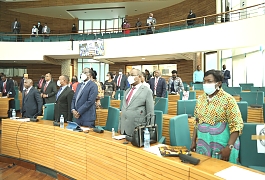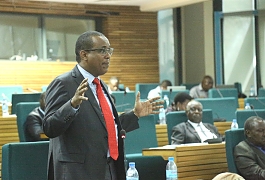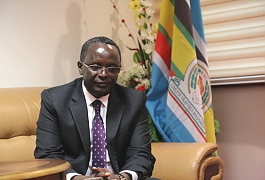The East African Legislative Assembly (EALA) resumes business next week in Arusha, Tanzania. The Plenary which takes place from Monday, May 26th, 2014 to Friday, June 6th, 2014 is the Sixth Meeting of the Second Session of the Third Assembly.
The Assembly which shall be presided over by the Speaker, Rt. Hon (Dr) Margaret Nantongo Zziwa expects to debate on the following Bills and reports:
- EAC Integration (Education) Bill, 2014 – 2nd and 3rd reading
- EAC Appropriation Bill, 2014 and the EAC Supplementary Appropriation Bill 2014
- receive and consider reports from various Committees of the Assembly
- consider Motions and Questions brought before the House.
EALA is also expected to receive and deliberate on the EAC Budget Speech for the Financial Year 2014/2015. The Budget Speech shall be delivered on May 29th, 2014 by the Chairperson of the Council of Ministers, Hon Phyllis J. Kandie.
The EAC Integration (Education) Bill, 2014 is anchored on Article 7 of the EAC Treaty, providing for people- centeredness and a market driven economy. The Bill deals with civic education in the region and aims to equip East African citizens with the necessary skills and information about the EAC.
Furthermore, the Bill seeks to establish a unit within the Office of the EAC Secretary General, mandated to coordinate integration education in the EAC Partner States. The proposed unit is to develop educational materials and set standards and quality control measures.
Accordingly, the respective national institutions currently responsible for conducting civic education in the Partner States are proposed within the Bill to be the national focal points. So far, EALA has been around the Partner States and met with various stakeholders in a bid to collect views on the proposed Bill which sailed through the first reading during the First Reading in Kampala, Uganda, in January 2014.
The Budget Speech is a key activity of the Community. Last Year, EALA approved a budget amounting to $131,806,032. The budget’s priorities then were to consolidate the Common Market; completion of negotiations and movement towards the East African Monetary Union Protocol; investment promotion and Private Sector development; co-operation in cross-border infrastructure; enhancing the extractive and processing industries; implementation of the critical activities of EAC Food Security and the mainstreaming of policies, programmes and projects related to gender.
In January 2014, EALA approved a supplementary budget giving the EAC go-ahead to expend an additional USD 2,143,960 for the Financial Year 2013/14 to meet its programmes. The supplementary budget was earmarked for support in activities related to Agriculture, Trade and Customs, the EAC Financial Management Harmonisation Project and the strengthening of the East and Southern Africa-India Ocean (ESA-IO) Maritime Security Project.
The key reports to be tabled to the House at the two week session emanate from the Committee on Agriculture, Tourism and Natural Resources on the 2nd Parliamentarians workshop on Climate Change and that of the Committee on Communication, Trade and Investments on the Single Customs Territory.
The House shall also deliberate on the Report of the Committee on Accounts on Internal Audit Systems and the Report of the Committee on General Purpose on the EAC Annual Report for the period 2011/12.
NOTE TO EDITORS
The East African Legislative Assembly is the Legislative Organ of the East African Community. Its Membership consists of a total of 52, of whom 45 are elected Members (9 from each Partner State) and seven ex-officio members (the Ministers responsible for EAC Affairs from the Partner States, the Secretary General of the Community and the Counsel to the Community).
The East African Legislative Assembly has Legislative functions as well as oversight of all East African Community matters. The enactment of legislation of the Community is effected by means of Bills passed by the Assembly and assented to by the Heads of State, and every Bill that has been duly passed and assented to become an Act of the Community and takes precedent over similar legislations in the Partner States.
Last year, EALA launched its second Strategic Plan (2013-2018). The formulation of the Strategic Plan was an all-inclusive process involving the EALA Commission, Members, staff and other stakeholders.
The Strategic Plan has six main strategic issues:
1. EALA’s main Administrative Autonomy, Capacity and Efficiency.
2. Negotiations for the EAC Pillars of integration.
3. EALA’s corporate image, institutional status, growth and development.
4. Capacity building in regional Parliamentary Practices.
5. Effective, sustainable and Results-oriented communication and sensitization on EAC integration.
6. Robust and effective Monitoring and Evaluation



